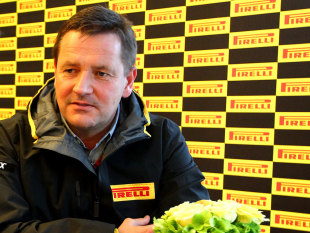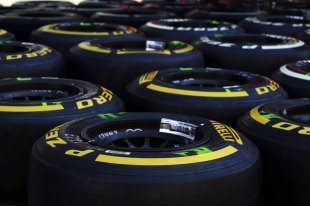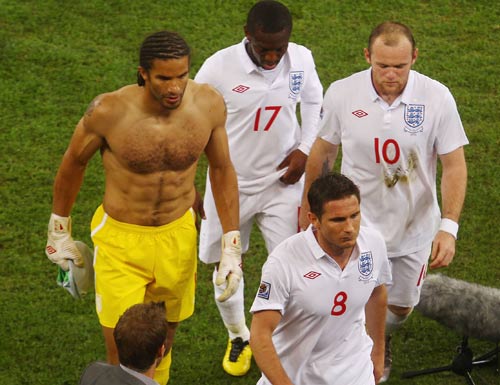- Paul Hembery Q&A
From tyre blankets to tyre wars - Pirelli's future in F1
Laurence Edmondson August 6, 2012In the second part of ESPNF1's exclusive interview, Pirelli motorsport boss Paul Hembery talks about qualifying tyres, a ban on tyre warmers and his company's plans after its current F1 contract runs out

One change that gets talked about a lot is the introduction of qualifying tyres. Are we now beyond the point where you need a decision if we are going to have a specific compound by 2013?
There are a couple of solutions if it's just about getting the cars running in Q3. We could offer to change the tyres used by the Q3 teams overnight so that on Sunday they start with a new set. That way there would be no advantage in not running and that would be a simple decision. Ultimately for the spectacle, and from our point of view because it would give us another product to talk about, a qualifying tyre is something we'd be happy to entertain going forward. Drivers who had it in the past say it was always great fun to feel the maximum grip for a couple of laps knowing you've got to do your perfect lap. That creates another tension from a driver's point of view. We've seen a bit of that this year, there's been more running and because the cars are so close together the qualifying this year has been of the highest order. Particularly in Q2 you can often see 15 cars within a second, and when you've got that level of competition any small error that a driver has on his qualifying lap will be amplified in terms of grid position. In previous years there was always more of a margin to the next car that isn't there this year. Certainly Q2, I've found personally is very exciting.
Another change that has been talked about in recent weeks is a ban on tyre warmers, presumably that isn't possible until 2014 due to the changes that would be needed with the compounds...
You'd need at least a year and there are a lot of people in the paddock that say they wouldn't like to do it because they'd end up running more laps to get tyres up to temperature, pressures and stabilisation. The feeling is that for the €200,000 to €250,000 you would save in terms of transport costs, it's a very minor cost for allowing a certain level of stability - these cars are of a particular nature and type. Don't get me wrong, it's something you could do but it changes fundamentally your approach to compounding for these cars and the majority of engineers we've spoken to are not keen on it because it just creates another area of question marks. You only need one driver to go off in the first corner on cold tyres and cause a bit of damage and you've spent your €200,000 on repair bills in one little incident. So there's not a huge appetite among the teams and although we could do it we would need a year and we'd have to reinvent the compounds, change our philosophy and we'd probably spend more doing our testing than the sport would be saving. Additionally we would need a new car to do it because it would have a huge interaction with the car and unfortunately our limitation today is that we are not allowed test cars that are current.
With 2014 and the end of Pirelli's contract in mind, what is the general feeling from the board about how successful the past one and a half years have been for the brand and ultimately whether that will lead to a continuation of the contract in 2014 and beyond?
We need to have a decision from the sport by June of next year. That's the closing date, although that's very late and in reality I think we need an indication before the end of this year. If the sport would like us to continue and if the overall conditions remain competitive and the sport has the vision that we think it has going forwards then it remains an attractive proposition for Pirelli. We see great benefit in a sport that is genuinely global - in fact you struggle to think of any that are genuinely global every year. Most international sports tend to be like the Olympics and in a fixed location. Of course they create a lot of interest globally but it's every four years as well. So F1 is a unique proposition from that point of view and that appeals to us as we're growing in regions like Asia and in countries like Russia and the USA. There seems to be a considerable effort from the organisers and the promoters to finally get the USA sorted and back on the map. These are all areas where we want to be seen to be present as a business, so it has a good fit with our business plan. The board at the moment are very happy, but of course things could change, the rules could change, costs might change substantially and those are all question marks that you always have to review. So when and if the sport wants us to continue and says it is happy with what we are doing, then we'll look at how we come to an agreement and if it makes sense and the return is still in line with the investment then we will be happy to go on.

In recent weeks you've passed comment on a 'tyre war' in Formula One, which could be possible if the FIA allow more than one supplier in 2014. What kind of impact would that have on Pirelli from a marketing point of view?
Well there's two points here. If I put my engineering hat on then obviously fighting with another tyre manufacturer is very stimulating, exciting and it creates a lot of interest internally. If I then put my marketing and business hat on, from what we've seen - and we compete in various championships such as GT racing and also in rallying - it's very hard to sell your expertise in beating another tyre manufacture. At the end of the day motorsport is about drivers ultimately and then it's about cars and unfortunately nobody goes around saying they've won a race because of the tyres - it's always about the driver and the car. So even when you're in competition and you're winning it's a very hard sell to convey to the public what your input is. The only way you can possible do it is by having a team split with one tyre brand on one car and one on another. Then, possibly, you've got a chance of convincing someone. But then you have to ask if there is an appetite from the public to see tyres battling and I don't personally think there is. So you have to take a step back and look at what you are actually bringing forward to the sport. It's slightly different for car manufacturers because people get very affectionate towards their car brands and that's different. But ultimately motorsport is about the driver.
When we look at it it's hard to balance what you are going to spend developing the product and making your tyres go quicker with what you can actually then give back to your business in terms of recognition of brand. That is an issue and when you look at it in the cold light of day it's hard to justify. If it was very clear what you were doing and you were superior to your competitor then maybe there is an argument for it. But from everything we've seen it's very hard to convey that and transfer it through to the end user.
In fact most people still struggle to understand what went on during the 'tyre war'. What you ended up with was a couple of companies doing a great job but focusing on one or two teams to the exclusion of all the others. So from a sporting equity point of view it was great if you were a big team but if you were one of the mid-ranking or lower teams then you basically haven't got a hope and that's also not good. As for the teams themselves, they recognise the cost increases when there is a tyre competition. If people today say it's difficult mastering the tyres and that it is a big question mark then if you have a tyre competition they will spend a huge amount of money trying to maximise the performance advantage of an individual tyre. Things go in waves and maybe there will be a point in time when there is that stimulation that the teams would like, but there is no appetite for that at the moment. Of course, tyres are out of their control and that is something that I'm sure they don't like, because if you're a competing team you at least want the same material with something as critical as the tyre as the next team. If you haven't got that then you are really out of control of what you are doing as a team.
So it's a whole mix and ultimately there's also a safety issue when you start pushing tyres to the limit. There is a risk of a repeat of an Indianapolis (2005) event where you are pushing the performance and you maybe underestimate the effects of a certain circuit on a tyre because you're pushing the limits. That's not good for any tyre maker, that's really negative, and I don't think you want to see any tyre maker having those kinds of issues. We are a safety product ultimately and even in a control-tyre, one-make series you can run into situations where you have difficulties by the very nature of an extreme sport like Formula One. So you don't want to be creating a situation where you know that the risk levels are going to be much greater because of the competition. So there are a lot of factors involved there.
Are we for or against it? There are different points of view in the company. As I said, if I put my engineering hat on then yes, let's do it, it's good fun. But if you look at it from a cost/benefit analysis and how you convey winning against another competitor then it's almost impossible. A good example would be something like rallying where we went into competition and we won a few titles and our competitor won a few and then we pulled out of the sport and there was a brand change for our competitor and at that point Sebastien Loeb was winning and dominating the sport. We then came in with a control tyre and Sebastien Loeb was winning again. We then left the sport and a new company came in and Sebastien Loeb and Citroen were still winning! It's very dependent on the sport and what cars and drivers you have. Those are factors that quite rightly should dominate motorsport.
Laurence Edmondson is the deputy editor on ESPNF1
© ESPN Sports Media Ltd.
 Laurence Edmondson is deputy editor of ESPNF1 Laurence Edmondson grew up on a Sunday afternoon diet of Ayrton Senna and Nigel Mansell and first stepped in the paddock as a Bridgestone competition finalist in 2005. He worked for ITV-F1 after graduating from university and has been ESPNF1's deputy editor since 2010
Laurence Edmondson is deputy editor of ESPNF1 Laurence Edmondson grew up on a Sunday afternoon diet of Ayrton Senna and Nigel Mansell and first stepped in the paddock as a Bridgestone competition finalist in 2005. He worked for ITV-F1 after graduating from university and has been ESPNF1's deputy editor since 2010

